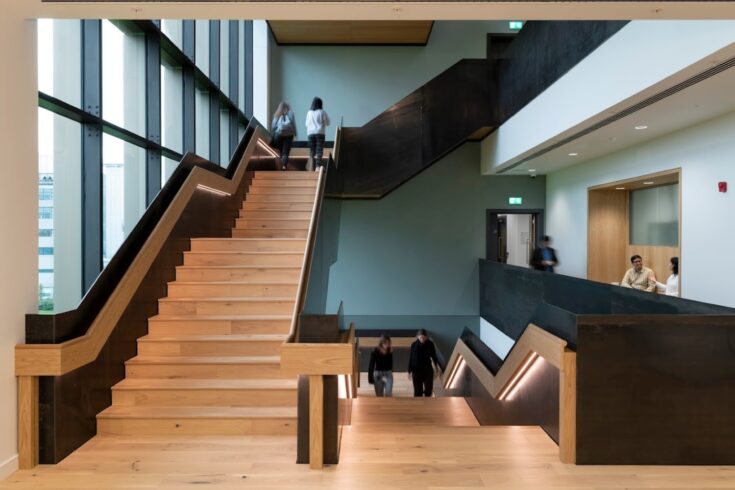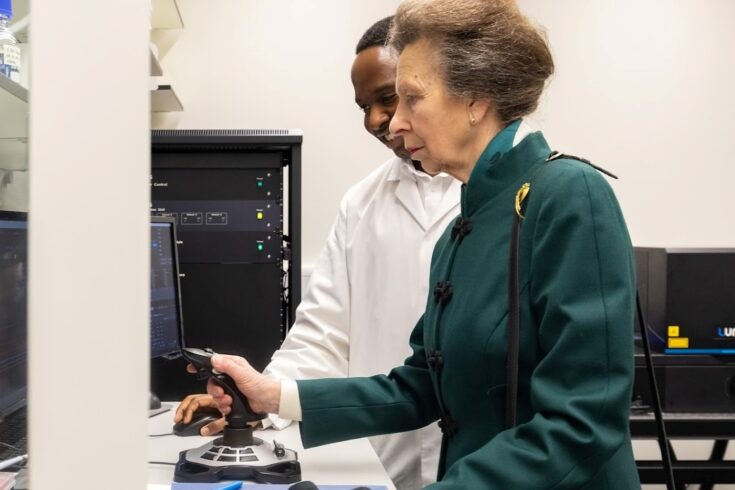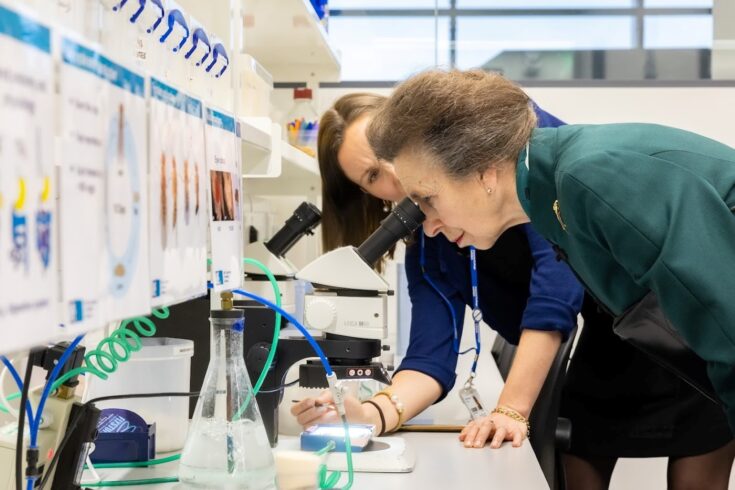The institute’s new home is a striking eight-storey building clad in anodised aluminium and houses 400 scientists working across themes including:
- genes and the environment
- heart and metabolic disease
- sex-based differences in disease
The institute is hosted by Imperial College London and is one of only two laboratories in the UK wholly-funded by the Medical Research Council (MRC).
The new building was designed to amplify the institute’s core strength of bridging the gap between scientists exploring fundamental biological mechanisms and those translating that work into clinical applications.
Its modern design is a step change for scientists working at the laboratory, which traces its history back more than 60 years. The building’s central staircase and atrium visually connect all floors, encouraging researchers from a range of different disciplines to socialise and collaborate.
Collaboration was also the spirit of the building project itself, marked by the project winning the Construction Excellence Award 2023 (South-East) for collaboration and integration.

Credit: MRC LMS
New building fosters team-science approach
LMS director Professor Wiebke Arlt, who was appointed in January 2023, takes a bold new approach to research by championing challenge-lead team science.
Unlike the individualistic ‘hero science’ of the past, the team science approach builds dynamic collaborations around specific biomedical challenges co-designed with a range of stakeholders including scientists, clinicians, patients, and the public.
While team science has been advocated by other organisations, this is the first time it has been enshrined in a research strategy for a core-funded UK government institute, turning the traditional approach to research on its head.
Transcending disciplinary boundaries
Professor Wiebke Arlt, Director of MRC LMS, said:
We are delighted to welcome The Princess Royal to MRC LMS.
Our new building’s design fosters an environment highly suited to team science that transcends disciplinary boundaries, bringing together clinical and non-clinical scientists in a shared space designed for collaboration, training and mentorship.
By actively welcoming people from our local community, organising public lectures and participating in community events, the laboratory is also fostering collaboration beyond its walls.
We will continue to build bridges between our scientists and the public, enabling a better understanding of complex issues.
Our researchers also actively visit our local communities and schools to share our research, demonstrating the LMS’ societal impact through education and engagement.
Facilities host groundbreaking research
During the opening, The Princess Royal was shown around some of the key facilities in the new institute.
They included the ‘fly lab’, where researchers are exploring the factors underpinning ageing and metabolism, and how these translate to human health and disease.
For example, research in the fly lab has shown that sugar induced diabetes, known to decrease the survival of humans, does not impact the lifespan of flies. The race is now on to uncover the science behind this difference to see whether humans can benefit from this discovery.
Another lab featured in the tour was that of Professor Rueda. This is where researchers use video game technology to stretch a single strand of DNA (more than 30,000 times smaller than a human hair) to explore how tension and coiling affect our genes.
The team’s work provides insights into the impacts of new gene editing techniques such as CRISPR.
The tour also included the cardiac imaging facility housing a new artificial intelligence tool that can detect signs of ageing in the heart that are invisible to the human eye.

The Princess Royal capturing a single strand of DNA with PhD candidate Quentin Smith. Credit: MRC LMS
Building upon a unique legacy
Patrick Chinnery, Executive Chair of MRC said:
We are honored and deeply grateful to HRH Princess Royal for inaugurating the new home of the MRC Laboratory of Medical Sciences.
Today’s event builds upon a unique legacy, as Princess Royal also opened the lab’s first building in 1995. Her continued support for the MRC, for science, and especially championing women in STEM is truly valued.
As one of MRC’s flagship institutes, LMS underscores the importance of long-term investment in science infrastructure, and particularly MRC’s commitment to research relevant for human health.
We look forward to continuing to work in collaboration with Wiebke and the LMS team in this new exciting era.
Further information
New institute building funded by MRC and Imperial
Funded by MRC with significant investment from Imperial College London the new building is situated on the Hammersmith hospital site of Imperial College Healthcare NHS Trust.
The close proximity to the rapidly expanding Imperial White City Innovation Campus further ensures that this strategic alliance will translate scientific discoveries into medical breakthroughs, innovative technologies and economic impact.
The LMS was first conceived in 1959 and opened by Her Majesty Queen Elizabeth II in 1970 when it was located at Northwick Park Hospital in Harrow.
The institute later moved to the Hammersmith Hospital site and was opened by The Princess Royal in 1995. In 2015, driven by the demands of 21st century science the planning for the new building, with collaboration and sustainability in mind, began.
About the MRC LMS building
The MRC LMS was commissioned by MRC with investment from Imperial College London. Project and cost managed by Turner and Townsend, the architects were Hawkins Brown, and the main construction contractors were Walter Lilly, with Buro Happold acting as structural and service engineers.

